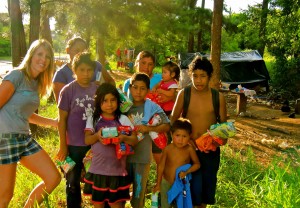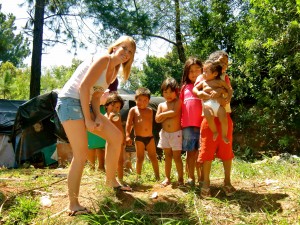February 2012
Work for All – Special from Brazil
 by Melissa Leonard
by Melissa Leonard
I recently spent a few days camping in Brazil. On our first night a young boy, around 8 or 9 years old, approached our campsite as we were cooking meat for dinner over the fire. This little boy was clearly malnourished and could barely speak enough Portuguese to ask for food. He said “carne” (meat) and we understood his situation and gave him some of our meat and bread to take home to his family. With the hungry boy right in front of me, I would have had a lot of trouble eating my dinner without giving him some as well. Few people would have done any differently. However, there are a lot of hungry children in Brazil and even more in Africa, China, and India. I cannot possibly give them all food but does that mean I should not help one boy? At Work For All we believe that if each company with means contributes a little, together we can make a big difference.
This picture was taken when I approached some natives living on the roadside. While we were taking the pictures, they told us that school starts soon, and they asked us if we had any clothes for the kids. We told them we would return with some. We bought a couple of backpacks and filled them with clothes and school supplies. The scrap plastic and branches in the background is where they live. These kids literally don’t have clothes. It is impossible not to feel compelled to help in whatever way I can.
DOES OUR CULTURE DEFINE OUR RESPONSIBILITY FOR OUR “FELLOW MAN”?
This month, I pose four questions inspired by Melissa’s recent experience in Brazil. In subsequent newsletters, I will provide the answers suggested by some of my favorite economists and philosophers.
1# There are more people who want to work than are actually working. Why is that? There is no limit to the number of tasks we could devise that would improve the human condition for all of us. Do unemployed people only want to work with conditions attached? If so, what are those conditions, and how can we meet or change them?
2# What are basic needs? Are we responsible to provide basic needs to each other? Most people feel that children should not go hungry, but who should feed the them? Is it our responsibility to care for our neighbor’s children? If they have one child or thirty children ” where does the limit of responsibility stop? Or does it? (One my Foster Children in Africa sent me a letter saying that her father was actually married to five wives, and all the wives had many children)
3# Is the ability to reproduce without constraint a human right? If so does that make reproduction a basic need? If more educated people have less children, (oops – I have six children myself), can we reduce the population of the world through educating people? Are there other ethical solutions?
4# In the developed world, more population increases economic activity and the gross domestic product of the country. Immigration is actually good for the overall economy (but perhaps not popular for other reasons). Why does this not work in less developed economies?

